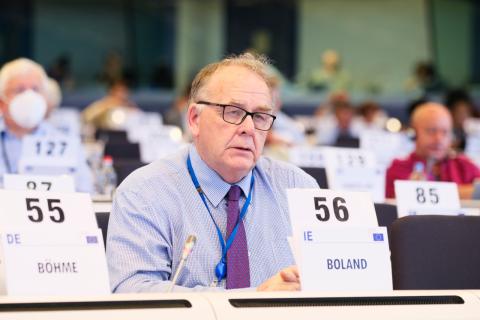European Economic
and Social Committee
Speech by President Séamus BOLAND on ensuring gender equality and tackling gender-based violence
EESC plenary debate linked to the adoption of the opinions SOC/726 on Combatting violence against women and SOC/731 on Gender equality, with Christina Fabre, Team leader on gender-based violence, European Institute for Gender Equality (EIGE).
Dear Ms Fabre, dear colleagues,
As some of you know, a few months ago in Ireland, Ashling Murphy was killed when out running in a well frequented public area, very close to where I live. This was a young woman, whom I knew and whose family I know. Ashling was killed, simply for being a woman. And this is yet another example of the unacceptable differences in everyday levels of safety, between men and women.
Gender based violence is a very serious societal problem, which unfortunately only becomes visible after a complaint has been made. It is the ultimate expression of gender discrimination and of the exertion of power. When I read that 1/3 of girls and women in the EU have been the victim of physical or sexual violence, I was shocked. But when I discussed these same figures with my daughters, they were not surprised.
And this is the problem: gender violence and inequalities are directly linked to traditional male-dominated societal roles, which begin in childhood and put up barriers to the well-being, safety and career development of half of the European population. And this is in Europe, with our high social standards and Articles on equality in European Treaties.
Interestingly, the first European references to gender equality are to be found in the 4th Century BC, in Plato's treatise 'The Republic'. In his text, women are expected to participate fully and equally in the life and guardianship of the City-State. As Plato famously said: If women are expected to do the same work as men, we must teach them the same things
. This reminds me of a famous African proverb which says that If you educate a man, you educate an individual. But if you educate a woman, you educate a family
.
So allow me to express my full support for the two EESC Opinions, which call for the necessity for nurturing a life-long gender equality culture
, throughout the whole life cycle and tailored to each stage of life. The approach must be holistic and systemic, involving early childhood education of both genders, teaching respect, human rights and promoting successful female role models. And all of this will require commitment to and ownership by all actors in society, particularly civil society.
I am very pleased that the EC has finally proposed an EU legal instrument for combatting violence against women and domestic violence. And I am even more pleased that the proposed EC Directive covers all forms of violence against women, including banning the forced sterilisation of women with disabilities. Undoubtedly, girls and women with disabilities, or refugees or from ethnic & cultural minorities, are even more vulnerable to gender-based violence. So any future EU legislation must be comprehensive and 'water-tight', to avoid loopholes.
Dear colleagues, I will bring my comments to a close by saying that I find it disgraceful that 6 EU Member States have still not ratified the Istanbul Convention against violence to women and domestic violence (FYI: Bulgaria, Czech Republic, Hungary, Latvia, Lithuania and Slovakia). Perhaps I am naive, but I do still view the EU as the guardian of values and of human rights. But before we can preach beyond our borders, we must get our house in order. And signing the Istanbul Convention is a necessary first step. Thank you for your attention.
Work organisation
Downloads
-
Speech by Séamus Boland
